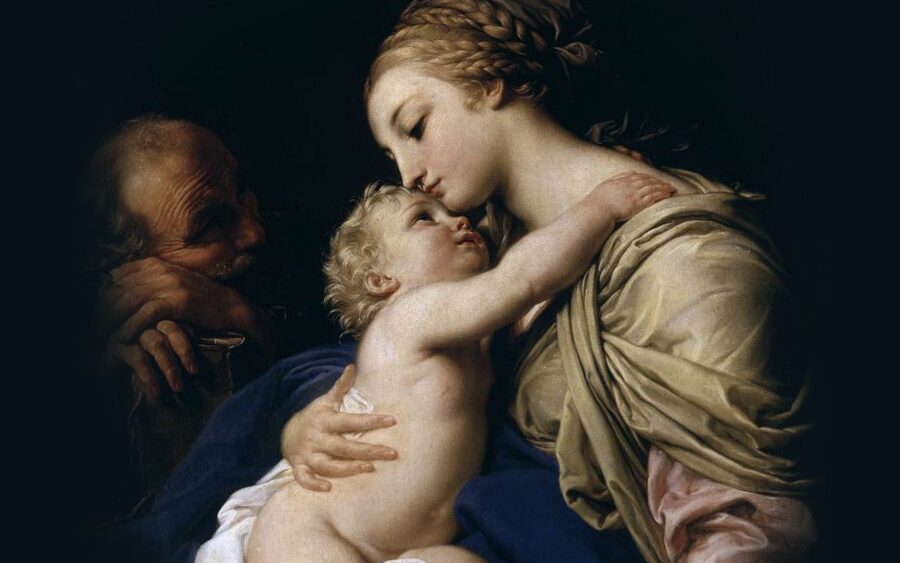Father Celso Júlio da Silva, LC, reminds us in this writing of the greatness of Jesus’ birth, inviting us to embrace His peace and glory.
Before the manger, as the human heart longs to contemplate God, God then grants a sign: “you will find a baby wrapped in cloth and lying in a manger” (Lk 2:7).
God always insists that we ask for such signs when He told Ahaz: “Ask for a sign from the Lord your God, either in the deepest depths or in the highest heights!” (Is 7:11). The prophet Isaiah then announces the sign that dwells in the heavens and descends to the depths of the earth: “Behold, a virgin shall conceive and bear a son, and shall call his name Emmanuel” (Is 7:14). Asking for a sign and receiving it with a simple heart like that of the shepherds in the gospel involves recognizing that this sign encompasses the highest of heaven to the deepest of our heart’s earth.
What then is the highest and the deepest that presents itself as a sign for men? The evangelist Luke points to the presence of that sign in the heights and in the depths: “Glory to God in the highest, and on earth peace among those with whom he is pleased” (Lk 2:14). Glory and Peace are touched in Bethlehem’s manger. The Glory in the heights and the Peace in the depths, here is the sign of the one who rests in the manger.
Admirably, Origen, a great teacher of the patristic era, comments on the vastness of God thus: «The sign proposed is my “Lord” Jesus Christ! (…) In the depths because “he is the one who descended,” and also “in the heights,” because “he is the one who ascended above the heavens.” However, regarding myself, this “sign” … is of no use if the mystery of His “deep” and “exalted” does not become for me. When I have embraced the mystery of Christ Jesus, in His “deep” and “exalted,” then I will receive the “sign” according to the Lord’s command… If, of course, someone knows how to make use of spiritual consideration, understand that the expression: “in the depths and in the heights” is not presented as an alternative; it precisely means embracing both» (Origen, Homilies on Isaiah, II, 1). Thus, embracing that sign is welcoming Christ into our hearts, who deserves Glory and brings us Peace.
On this Christmas, it is of no use to sing the Glory of God in heaven and His Peace among men if the mystery of His coming does not enter our hearts. The mystery of a God who dwells in the heavens and comes to pitch His tent among us (Cf. Jn 1:14) is fully embraced. The Glory of God is united with the Peace that men long for and strive to establish among themselves through the grace of God’s presence.
What good is it to know that the Word became flesh if we have not embraced His glory and peace by incarnating them in our lives, in our war-torn world, in our family, in our surroundings? To accept the sign like the shepherds means placing our hope in a Child who has fallen into the furrow of this earth like a gentle morning dew. His presence in the depths of our human existence is the joy of a hope that does not disappoint. With the psalmist, with that embrace of God for all creation: “Let the heavens rejoice, let the earth be glad, let the sea roar, and all that fills it; let the fields be joyful, and everything in them; let the trees of the forest sing for joy. Before the Lord, for He comes, for He comes to judge the earth: He will judge the world in righteousness, and the peoples in His faithfulness” (Ps 96:11-13).
It is clear that asking for signs is very easy, but receiving signs requires much docility. It is no coincidence that humble shepherds were granted the grace to see such a sublime sign in the depths of a cave. No one can contemplate the greatness of God if they do not have the humility to seek Him in the simplicity of a cave, where there is nothing but “a baby wrapped in cloth and lying in a manger.” Humility before the manger is the only key that can open the door of faith for every Christian to see “the exalted and the deep” of God in the tender flesh of a Child. After all, we cannot fully understand God, especially if our eyes simply see a little one.
However, with humility in asking for a sign and accepting it in faith, we can then approach Bethlehem recognizing the greatness of God in the humble manifestation of a birth that is not at all ostentatious. Because in this, Casiodoro was right when he said that “too much greatness is understanding His smallness” (Casiodoro, De anima c. 11). Yes; if we are humble, the smallness of a Child will magnify our soul, and we will accept that the exalted and the deep have agreed this Christmas. Yes, too much greatness is understanding His smallness, that is, the one born is immense because He has taken on the narrowness of humanity. Thus, it is understandable that eternity embraces time; if it were otherwise, it would be not only difficult to believe but even to understand.
Glory and Peace. The sign laid in a manger that we see with humble eyes of faith is the Lord of Heaven and Earth, of the exalted and the deep, of the Glory He deserves as God and of the Peace He brings to men. But at this rate, we should not think of peace on a large scale—though we need it more than yesterday—just look around us. Moreover, just look inside ourselves. Is there peace? Truly, is there peace deep within our soul?
That God who embraces the highest of heaven is the same who, this Christmas, wants to embrace the deepest and most hidden part of your heart. He wants to unite the glory you give to peace, which you perhaps do not know how to ask for. As we approach another year to the manger, let that Child, as a sign from heaven, embrace our divided life with discord. Ask for the grace of peace within your soul, for that Child also wants to be Lord of the deepest part of your being, where only you and He enter together.
What good is that Child lying in a manger one more year if you do not let Him embrace you with His peace? Ask for a sign for yourself, as Ahaz asked for a sign for himself! Why do you ask for so many material gifts every Christmas and always end up empty and unsatisfied? Because asking for what is essential is for noble souls. It only takes a humble heart, like that of the shepherds, who do not ask many questions nor make excuses before the mystery of His birth. The peace that this world needs and that we also long for is at the same time the glory of God.
When we recognize in our brother and sister their dignity and worth in the eyes of God; when we respect the rights of a people, a nation, a culture; when we understand and integrate differences of opinions, ways of thinking, and doing; when we listen respectfully and attentively to those who need to vent; when we give a little of our time to those in need; when we know how to silence what could be a bomb capable of hurting or killing our family, our community, our neighbor; when we complain less and thank more, that is when we give glory to God and there is peace on earth.
Today, a sign from the highest of heaven has descended before the manger. Only the humble of heart can be embraced to the depths of the soul by the Son of God, who has come to touch the deepest part of our humanity. He is the Glory, and only He offers us Peace. His flesh is the only source of peace that will end hatred and war. In His tender and fragile flesh, today all who suffer find a place, a rest, and a meaning amid suffering. Only He is our hope and our peace!
Merry Christmas!
Other reflections by Father Celso Julio da Silva, LC:










